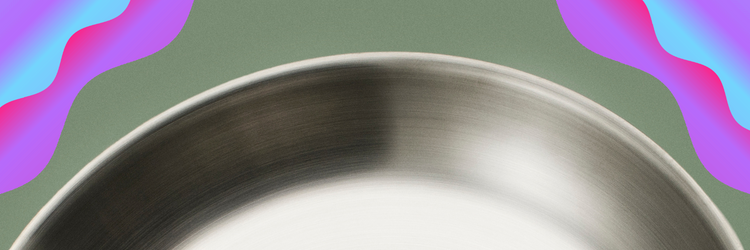Everything You Ever Wanted To Know About Stainless Steel Cookware

Whether you’re looking to transition away from non-stick, or need a few talking points to convince your roommate/mail person/second cousin to embrace their steely side—here are the need-to-know basics of stainless steel cookware.

What is Stainless Steel?
Say “stainless steel pots and pans” to most people, and they’ll likely imagine a professional kitchen, stocked to the gills with gleaming skillets and sauciers. Something about stainless steel seems fancy—as if only some kind of culinary sorcery could coax a perfect, golden brown sear from its surface—but also scruffy and indestructible.
Stainless steel, in its most basic form, is an alloy of iron and carbon enhanced with nickel and chromium. The shiny “stainless” look comes from the chromium, while nickel lends durability and protection against corrosion.
What Does “Fully Clad” Mean?
What does it mean for a pan to be “fully-clad?” The term “cladding” refers to the layers of stainless steel that surround a magnetic center, usually aluminum or copper. Cladding ensures a non-reactive surface and even transfer of heat, calling on the strengths of each material to counteract or balance out the weaknesses of the others.
Tri-ply stainless steel (one layer of heat conducting metal sandwiched between two layers of stainless steel) is popular for its light, easy-to-handle weight, while some brands prefer 5-ply or even 7-ply for sturdiness.
What’s The Deal With Patina, Again?
“Patina” is technically what’s going on with all those seafoam green rooftops and statues all over the place: it’s a fancy word for oxidation. When it comes to cookware, patina refers to the stains that build-up on enamel-coated cast-iron or stainless steel pans over time. These stains don't impact performance, and can even act as a kind of easy-release surface.
If you prefer a shiny surface, make a paste with water and a non-abrasive cleaner like Barkeeper’s Friend or Bon Ami and rub it into the surface with a cloth. Rinse in warm water and wipe dry—good as new.
5 Benefits of Cooking with Stainless Steel Cookware
Getting comfortable with stainless steel can change the way you cook. Here's five reasons to invest in a piece or two.
- Stainless steel distributes and retains heat like a champ. Aluminum is a notorious conductor of heat, but without a heavy-duty outer layer, it can scorch ingredients and warp over time. Steel helps direct and distribute that raw power. (Tip: To prevent scorching, always start a dry pan over low heat, then add your cooking oil. Low and slow cooking is the name of the game when it comes to stainless steel pans, which typically don't require anything higher than medium heat.)
- Stainless steel is incredibly durable. Stainless steel cookware can withstand very high temperatures without warping, and, when cared for properly, lasts for generations. (Tip: Always let pans cool completely before washing.)
- Stainless steel is non-reactive. That means it won't rust, scratch, or break down when exposed to acidic ingredients or high temperatures.
- Stainless steel is low-maintenance. Contrary to popular opinion, stainless steel is far from finicky or fussy. Heat it slowly, and use the right amount of cooking fats, and there's nothing it can't do.
- Stainless steel is recyclable. Because it does not contain any coatings or plastics, stainless steel appliances (known as reclaimed scrap) may be recycled and turned into new products. Just don't throw it in your regular bins; contact your local scrap metal yard to learn more!
What Do Stainless Steel Grades Mean?
The grade of stainless steel informs its effectiveness in various settings and applications. 400-series, or ferritic, stainless steel, is commonly used on the exterior of pans because it is magnetic, making it compatible with induction stovetops.
This reactivity, however, is less than ideal for the interior of a pan, which is why most cookware features an “austenitic,” or 300-series stainless steel, for the cooking surface. Austenitic steel is highly durable and won’t corrode or rust (meaning it won’t react to acidic foods, like tomato sauce). Most cookware, ours included, is made with 304 or 304L stainless steel; 304 grade stainless steel may also be labeled further as 18/8 or 18/10, which indicates its total percentage of chromium and nickel.
Depending on the manufacturer, the best stainless steel cookware may feature multiple grades in one piece for maximum strength and efficiency.

How Is Stainless Steel Cookware Made?
Stainless steel cookware production happens in four stages:
1. Bonding: The individual layers of the pot or pan are stacked together, then exposed to high heat and pressure until they’re fused into a single sheet. These sheets are then cut into discs and checked for any irregularities.
2. Forming: The discs are pressed in molds—or, in the case of stainless steel pots, spun using a hydraulic press—into individually shaped pieces.
3. Finishing: The shaped pots and pans may be brushed, buffed, and/or hand-polished depending on the desired look and feel. Brushing patterns vary from starbursts to tree rings, while other manufacturers may prefer a mirrored or matte interior.
4. Riveting: The final step in stainless steel cookware construction? Fastening the handles to the body with sturdy steel rivets.
Can I Put Stainless Steel In the Dishwasher?
Heck yes you can. We know it will always feel wrong to some of you out there, but you can absolutely wash your stainless steel frying pan in the dishwasher without adverse effects.
Can I Use Metal Utensils on Stainless Steel Pans?
Yes, you can go to town with that metal spatula, or scramble your eggs with a fork. It may not be the ideal tool for the job, but it won’t…fork up the surface of your pan, either.